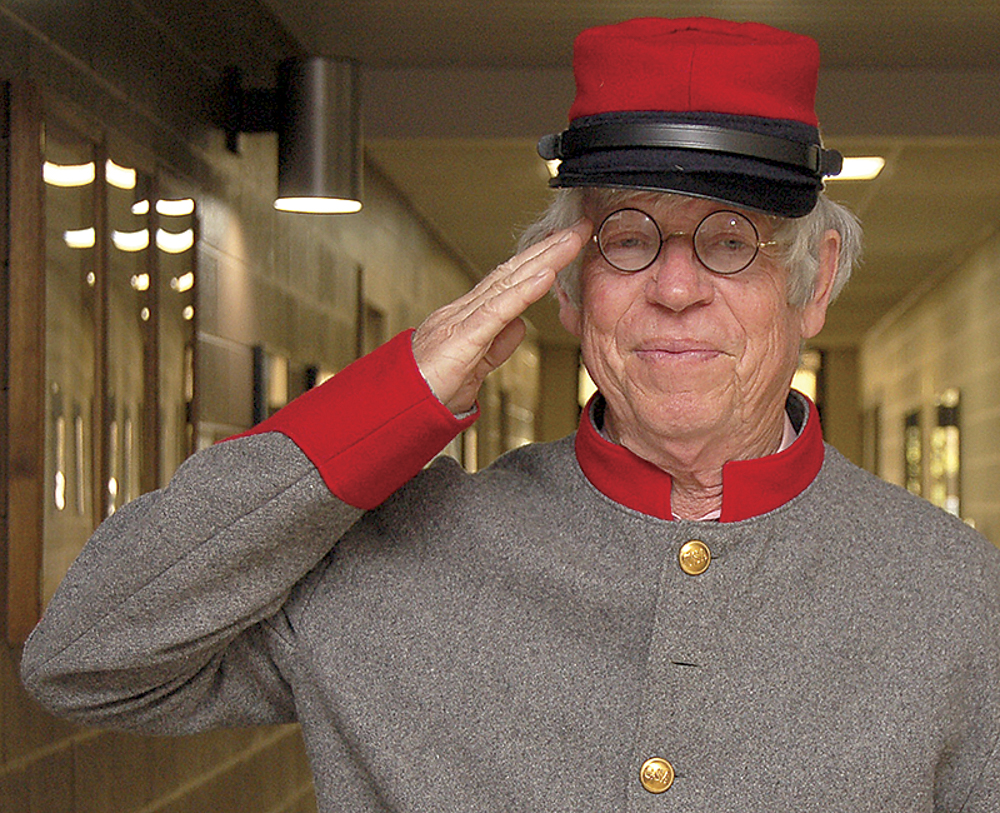
J.C. Davis (’70) has brought history to life for thousands of students during a teaching career that spans more than 45 years.
For as far back as he can remember, Davis wanted to be a teacher.
“I went to elementary school in a two-room building in Cumberland County, Tennessee, and I recall deciding then that I was going to be a teacher,” he said.
After graduating from Cumberland County High School in 1966, Davis attended Freed-Hardeman University and then continued on to Harding where two history professors in particular made a lasting impression.
“Both Dr. [Raymond] Muncy and Dr. [Joe] Segraves impacted not only what I learned, but the way I now teach history to my students as well,” Davis said. “They were role models of what a Christian teacher should be, conducting themselves as Christian gentlemen. I am deeply indebted to these two fine Christian teachers for all that I learned from them.”
Davis landed his first teaching job in Lake Providence, Louisiana, but soon found his new career had to be put on hold.
“I was teaching U.S. history and got drafted right out of class into the Vietnam War. I finished one semester and then went into the service in the Army Signal Corps. After basic [training], I was sent to Korea because by that time the conflict in Vietnam was winding down.”
Following discharge from the military, Davis went back to Harding where he earned a Master of Arts in Teaching and met his wife, Lana Delong (’69). After graduate school, Davis returned to East Tennessee where he was hired to teach at his alma mater, Cumberland County High School. He taught there 37 years before retiring in 2010.
Soon after accepting the position at the high school, Davis joined the faculty at Roane State Community College teaching evening classes and continues to teach there.
“I’d leave the high school and go to the junior college and teach a class or two on Tuesdays and Thursdays that started at 3:30 p.m. Some nights it would be 9 p.m. before I’d leave.”
Davis loves education, and his students can attest that he doesn’t just teach history; he embodies it.
“Education is probably 10 percent knowledge and 90 percent presentation,” he said. “Students are visual. I knew right away that I could hold their attention if they could just see it or somehow experience it.”
The idea to use “living history” — an attempt to simulate life in another time — occurred to Davis while he was chaperoning a history contest in Murfreesboro, Tennessee. He attended a faculty program led by a park ranger from Stone’s River National Battlefield.
“I wasn’t paying very close attention,” he said. “I was probably reading a book or grading papers.”
He recalls looking up as the speaker began putting on a Civil War uniform while he was presenting.
“That instantly caught my attention,” Davis said. “I knew that this was the way to teach history.”
Davis began thinking of ways he could do the same in his own classes and give life to his subjects from the past.
“It started when my class got to World War II. My dad and uncle served in World War II, and my uncle still had his uniform, so I borrowed it and wore it to class. That got students’ attention.”
This show-and-tell approach led Davis to collect artifacts from major events in U.S. history.
“The school had fundraisers to help me buy uniforms. My first uniform was from the Revolutionary War, which I still wear. After that I got one from the Civil War. I slowly added to it. Eventually I had a real collection. Just the other day I wore one from the War of 1812.”
Davis’ students are no longer surprised when they see their teacher walk into class donning a Seventh Calvary uniform from the Battle of Little Big Horn or a gas mask from World War I. They look forward to it, and so does he.
“There have been countless nights I would lay awake thinking about how much fun I was going to have the next day at school,” he said. “I just really enjoy teaching. I wouldn’t have been happy doing anything else as much as I enjoy teaching.”
Most often Davis’ lessons involve far more than simply dressing up in period clothing.
“There were times when we covered the Civil War that we’d go outside and set up camp. I even brought a cannon. We’d have a fire going, and I had another gentleman — an older guy who looked like he stepped right out of the Civil War — that did the cooking. He’d cook a big ol’ pot of soup and other foods that soldiers from that time often ate. Students would gather around the camp, and we’d serve a traditional Civil War meal including hardtack, parched corn and salt pork.”
“I have so much fun teaching that I often joke that I ought to be paying the school for letting me teach,” Davis said. “I recently remarked to the dean of the history department that ‘I teach for the fun of it; Roane State pays me to grade papers.’”
Davis could have retired from education years ago but continues to teach because he loves it so much. There will be a time when he hangs up his uniform and steps away from the classroom, and he knows exactly when that will be.
“When it ceases to be fun, I quit,” he said. “But for now I’m having too much fun!”
—Jonathan Murphy